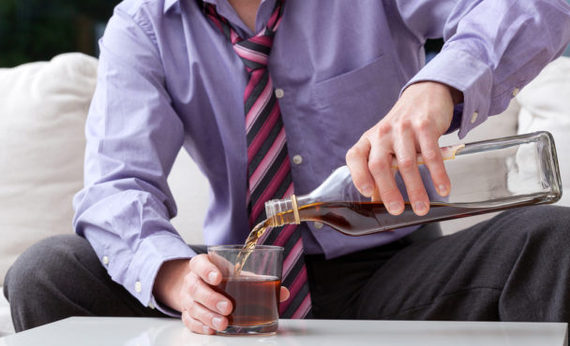Alcohol's reputation as a means to lower inhibitions, take the edge off stress and worries, and temporarily boost feelings of self-confidence can make it a charming companion in good times and bad. However, excessive drinking is too often a damaging path that leads to addiction and ultimately - broken relationships - at home and in the workplace.
In the workplace, two patterns of drinking arise that have a negative impact. Many people drink right before or during work hours (think lunch and company parties), while others drink heavily the night before, arriving at work with a wicked hangover or calling in sick. Together, these behaviors take a high toll on everyone involved and contribute to lost productivity, workplace accidents and injuries, employee absenteeism, low morale, and increased illness. Moreover, drinking by employees is linked to a variety of antisocial behaviors such as sexual harassment, verbal and physical aggression, and disrespect targeted at colleagues.
About 17.6 million adults in the U.S. currently suffer from alcohol abuse or dependence. Several million more people engage in risky, binge drinking patterns that can lead to alcohol addiction. Binge drinking means drinking five or more alcoholic beverages on the same occasion on at least one day in the past 30 days.
- In 2014, 60.9 million people ages 12 and older reported binge drinking.
- Every year, about 5,000 youth ages 21 and younger lose their lives due to underage drinking.
- In 2012, 58.3% of youth who tried alcohol for the first time were younger than age 18.
- Binge drinking on the weekend was reported by 24% of teens and young adults.
- In 2014, 37.9% of college students ages 18 to 22 reported binge drinking.
- About 92% of U.S. adults who drink excessively reported binge drinking in the past 30 days.
Workplace Facts and Stats
About 20% of workers and managers across a wide range of industries and company sizes said a coworker's on- or off-the-job drinking threatened their productivity and safety. Industries with the highest drinking rates are mining (17.5%) and construction (16.5%). The cost of excessive alcohol use reached $249 billion in 2010 or about $2.05 per drink. Of all these costs, the highest by far was attributed to a loss in workplace productivity (72% of the total cost). Research also indicates that alcohol was a factor in at least 11% of all workplace-related deaths.
Alcohol Takes a Physical and Mental Toll
Drink too much, especially long-term, and this can result in a host of physical and mental effects - none of them good. For example, drinking can make depression worse, and depression can increase drinking. People who drink alcohol are also at greater risk of abusing illicit drugs. Alcohol use is associated with a variety of illnesses such as liver disease and cancer, and binge drinkers are 72% more likely to have a heart attack. Perhaps most sobering, heavy drinking reduces life expectancy by 10 to 30 years.
Clouded Judgment, Conflicted Relationships
You don't have to binge drink for alcohol to take its toll. The point at which alcohol affects the ability to make sound decisions and live responsibly varies greatly from person to person. A young woman may drink two glasses of wine and feel tipsy, while her boyfriend is under the misconception he can get in a car and drive after four shots of hard liquor. Regardless of your personal tolerance level, drinking can greatly impair your capabilities at home and on the job. When it becomes habitual, it can destroy everything you hold near and dear. Marriages in which only one spouse drinks heavily end in divorce 50% of the time. Alcohol abuse is one of the top 10 reasons why employees get fired, and also related to at least four others including excessive absenteeism, the inability to get along with coworkers, not being able to perform assigned tasks, and work fraught with errors.
Bottom line:
It is a harsh reality that alcohol abuse can negatively impact mental and physical health, disrupt relationships, stall or destroy careers, and lead to financial ruin. The good news is that even if you've already burned personal and professional bridges, recovery is possible. When you begin the process of seeking help, you're one step closer to attaining the personal and professional success you deserve.
